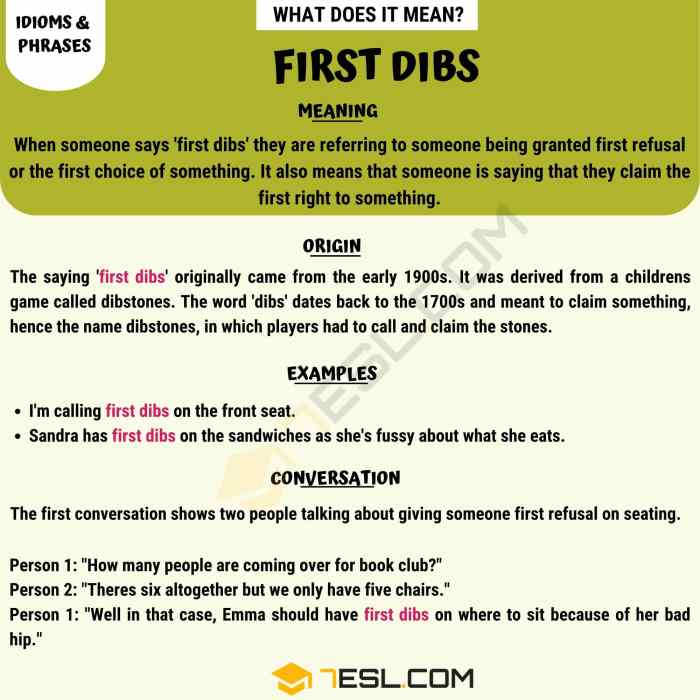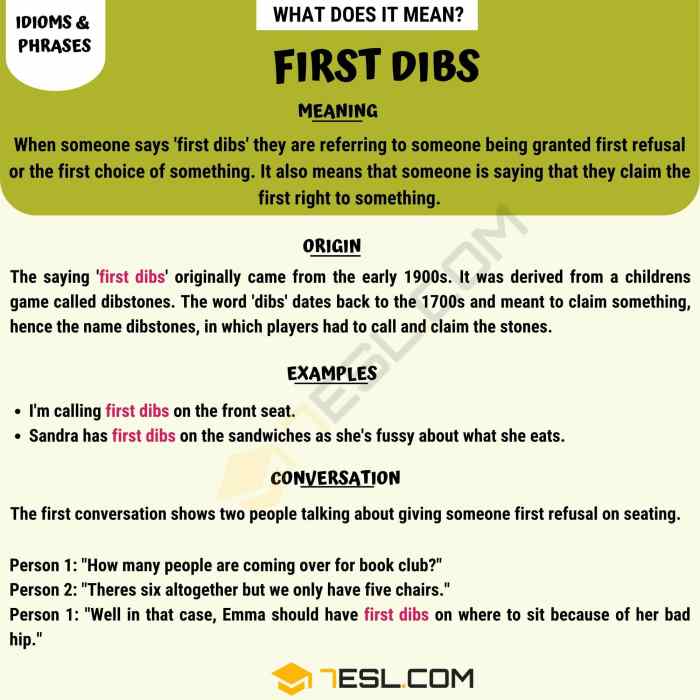Ist dibbs, a phrase that holds significant cultural and legal implications, is a fascinating concept that has been ingrained in our social interactions for centuries. This article delves into the multifaceted world of ist dibbs, examining its origins, legal implications, social conventions, psychological aspects, and variations across cultures.
From its humble beginnings as a playful way to claim possession to its legal enforceability in certain contexts, ist dibbs has evolved into a complex and intriguing phenomenon that warrants exploration.
Definitions and Origins: Ist Dibbs

Dibs, short for “dibses,” is a slang term that signifies a claim or ownership over something, often an item or a spot. It is commonly used in informal settings, particularly among friends or family members.
The term “dibs” has been in use since the 19th century, with its origins likely stemming from the Yiddish word “dibs,” meaning “honey” or “syrup.” Over time, the term evolved to signify a claim or ownership, likely due to the notion of something being “sweet” or desirable.
Historical Usage
Historically, “dibs” was used in various contexts, including claiming a spot in line, reserving an item, or asserting ownership over a particular item. For instance, in a game of tag, a player might call “dibs” on a specific hiding spot to prevent others from using it.
Cultural Significance
In contemporary culture, “dibs” remains a widely used term, particularly among children and teenagers. It serves as a way to establish a sense of ownership or priority, often in a playful or informal manner. The term has also found its way into popular culture, appearing in movies, TV shows, and songs.
Legal Implications

Calling “dibs” may not carry legal weight in most situations, but there are certain circumstances where it can have legal implications.
In property disputes, for instance, “dibs” can be considered a form of adverse possession, which is a legal doctrine that allows a person to claim ownership of property that they have occupied and used openly and continuously for a specified period of time.
To establish adverse possession, the claimant must prove that they have been in possession of the property for the required period, which varies by jurisdiction, and that their possession was exclusive, open, notorious, hostile, and continuous.
Enforceability of “Dibs” in Property Disputes
- In some jurisdictions, “dibs” may be recognized as a form of adverse possession if the claimant can prove that they have met the required elements.
- However, “dibs” alone is generally not sufficient to establish adverse possession, as it does not demonstrate the necessary exclusivity and hostility required under the doctrine.
- To strengthen their claim, the claimant must typically show that they have taken steps to improve the property, such as building structures or making repairs, and that they have acted as the owner of the property, such as paying taxes or preventing others from using it.
In other legal contexts, such as contract law, “dibs” may not be legally binding unless it is supported by consideration, which is something of value that is exchanged in return for a promise.
For example, if two friends agree that one of them has “dibs” on a concert ticket, but no money or other consideration is exchanged, the agreement may not be enforceable if the other friend changes their mind and sells the ticket to someone else.
Ultimately, the legal implications of calling “dibs” depend on the specific circumstances and the applicable laws in the relevant jurisdiction.
Social Conventions

The concept of “dibs” has become an ingrained part of many cultures worldwide, with distinct rules and expectations surrounding its usage in different social settings. Understanding these conventions is crucial for ensuring respect and avoiding potential misunderstandings.
In most cultures, calling “dibs” serves as a declaration of intent to claim ownership of a specific object or place. This claim is often recognized and respected by others, although the rules and expectations associated with it can vary significantly.
Cross-Cultural Differences
Cross-culturally, the social conventions surrounding “dibs” vary significantly. In some cultures, such as the United States, calling “dibs” is generally considered a legitimate way to establish temporary ownership of an object. In other cultures, such as Japan, the concept of “dibs” may not be as widely recognized or accepted.
In cultures where “dibs” is widely accepted, there are often specific rules and expectations associated with its usage. For example, in some settings, calling “dibs” must be done in a clear and audible voice, while in others, a simple gesture or nod may suffice.
Rules and Expectations
The rules and expectations associated with calling “dibs” can vary depending on the setting. In general, however, there are some common principles that apply:
- First come, first served:The person who calls “dibs” first is typically given priority, provided they meet any other requirements associated with claiming the object or place.
- Specificity:The claim should be specific and clearly indicate the object or place being claimed. Vague or ambiguous claims may not be recognized.
- Temporary ownership:Calling “dibs” typically establishes temporary ownership, not permanent ownership. The duration of the claim may vary depending on the context.
- Respect:It is important to respect the claims of others. If someone has already called “dibs” on an object or place, it is generally considered rude to try to override their claim.
Psychological Aspects
The act of calling “dibs” is often driven by psychological motivations that extend beyond mere practicality. These motivations can be rooted in concepts of ownership, scarcity, and social hierarchy.
Ownership and Possession
Calling “dibs” serves as a psychological claim of ownership over an object or space. By declaring possession, individuals establish a sense of control and belonging. This can be particularly important in situations where resources are limited or there is a perceived threat of loss.
Scarcity and Competition
The concept of scarcity plays a significant role in the use of “dibs.” When resources are perceived to be scarce, individuals may resort to calling “dibs” to secure their access to them. This behavior can be driven by a fear of missing out or a desire to avoid competition with others.
1stDibs, a renowned online marketplace for antiques and vintage items, offers an exquisite collection of 1st dibs jewelry. From intricate vintage pieces to contemporary designs, 1stDibs provides a vast selection of unique and exceptional jewelry pieces. Whether you’re seeking a statement necklace, a delicate bracelet, or a timeless pair of earrings, 1stDibs has something to suit every taste and style.
Social Hierarchy and Status, Ist dibbs
In some social contexts, calling “dibs” can be used to establish or reinforce social hierarchy. By claiming possession, individuals may assert their dominance or seniority within a group. This can be particularly evident in situations where resources are valued or highly sought after.
Variations and Analogies
The concept of “dibs” has variations in different languages and cultures, reflecting the diverse ways in which people claim possession or priority.
In many languages, the term “dibs” or its equivalent is used specifically for claiming an object or a spot. For example, in Spanish, the term “dibs” is translated as “dibs” or “derecho de tanteo,” while in French, it is known as “dibs” or “priorité.”
Similarities and Differences
Despite these variations, the underlying concept of “dibs” remains consistent across cultures. It involves a verbal or physical action that establishes a claim to something, with the expectation that others will respect that claim.
However, there are also some subtle differences in the way “dibs” is applied in different contexts. For example, in some cultures, “dibs” may be considered more binding than in others. In some cases, it may even be seen as a form of legal contract.
Overall, the concept of “dibs” serves as a useful social convention for establishing priority and avoiding conflicts over shared resources. Its variations across languages and cultures reflect the diverse ways in which human societies have developed mechanisms for maintaining order and fairness.
Examples and Case Studies
The concept of “dibs” manifests in various real-life situations, ranging from informal social interactions to legal disputes.
One common example is the use of “dibs” in social settings, particularly among children and close-knit groups. For instance, when a group of friends is discussing plans, one person may claim “dibs” on a particular activity or item, indicating their priority or right to it.
Legal Implications
In certain circumstances, “dibs” can have legal implications. For example, in some jurisdictions, the principle of “prior appropriation” in water law grants rights to the first person who uses water from a particular source. This principle essentially establishes a “dibs” system for water rights, giving priority to those who first claim and use the water.
End of Discussion

In conclusion, ist dibbs is a multifaceted concept that permeates various aspects of our lives, from casual social interactions to legal disputes. Understanding its nuances and implications allows us to navigate its complexities and appreciate its enduring significance in human societies.



